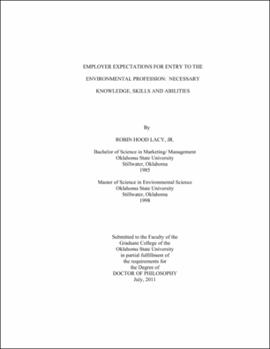| dc.contributor.advisor | Caneday, Lowell | |
| dc.contributor.author | Lacy, Robin Hood, Jr. | |
| dc.date.accessioned | 2013-11-26T08:29:49Z | |
| dc.date.available | 2013-11-26T08:29:49Z | |
| dc.date.issued | 2011-07 | |
| dc.identifier.uri | https://hdl.handle.net/11244/7106 | |
| dc.description.abstract | Scope and Method of Study: | |
| dc.description.abstract | This study was designed to elicit employer expectations for entry-level environmental professionals. Thirty-three experts from the environmental profession representing the private, government and non-profit employment sectors participated in a two-round Delphi study consisting initially of open-ended questions concerning knowledge, skills and abilities, followed by a Likert-scale rating exercise generated from the qualitative responses in round one. The expert's importance ratings to determinant themes and supporting statements emerging from the round one questions were analyzed through the use of SPSS 17.0 for mean and standard deviation resulting in categories of initial agreement, initial disagreement, and initial resolution of high importance. | |
| dc.description.abstract | Findings and Conclusions: | |
| dc.description.abstract | Experts participating in the two round Delphi study rated themes and supporting statements for importance by the use of a five point Likert-scale. The themes equated to questions posed to the experts: what does an entry-level environmental professional need to know to be successful in the field; need to be able to do to be successful in the field; what certifications are most important, and what college level courses are most important. The resulting data were compiled and analyzed for initial agreement, initial disagreement, and initial resolution of high importance. The end result of the research produced primary competencies for entry-level environmental professionals including integrity, effective communication skills, strong work ethic, effective interpersonal communication skills, writing effectively, resourcefulness, critical thinking, and coursework in college including science, risk, regulations and computers. It is hoped that this study will serve to clarify the expectations of employers regarding necessary knowledge, skills and abilities for entry-level environmental professionals, and that stakeholders including students, graduates, faculty, curriculum coordinators, career placement officers, and said employers will work together to produce environmental professionals that are qualified to make immediate, effective and enduring impacts on the industry. | |
| dc.format | application/pdf | |
| dc.language | en_US | |
| dc.rights | Copyright is held by the author who has granted the Oklahoma State University Library the non-exclusive right to share this material in its institutional repository. Contact Digital Library Services at lib-dls@okstate.edu or 405-744-9161 for the permission policy on the use, reproduction or distribution of this material. | |
| dc.title | Employer expectations for entry to the environmental profession: Necessary knowledge, skills and abilities | |
| dc.contributor.committeeMember | Lindenmeier, Donna | |
| dc.contributor.committeeMember | Shriver, Thomas | |
| dc.contributor.committeeMember | Rooney, John | |
| osu.filename | LacyJr_okstate_0664D_11651.pdf | |
| osu.accesstype | Open Access | |
| dc.type.genre | Dissertation | |
| dc.type.material | Text | |
| dc.subject.keywords | abilities | |
| dc.subject.keywords | delphi | |
| dc.subject.keywords | employer | |
| dc.subject.keywords | importance | |
| dc.subject.keywords | knowledge | |
| dc.subject.keywords | skills | |
| thesis.degree.discipline | Environmental Science | |
| thesis.degree.grantor | Oklahoma State University | |
